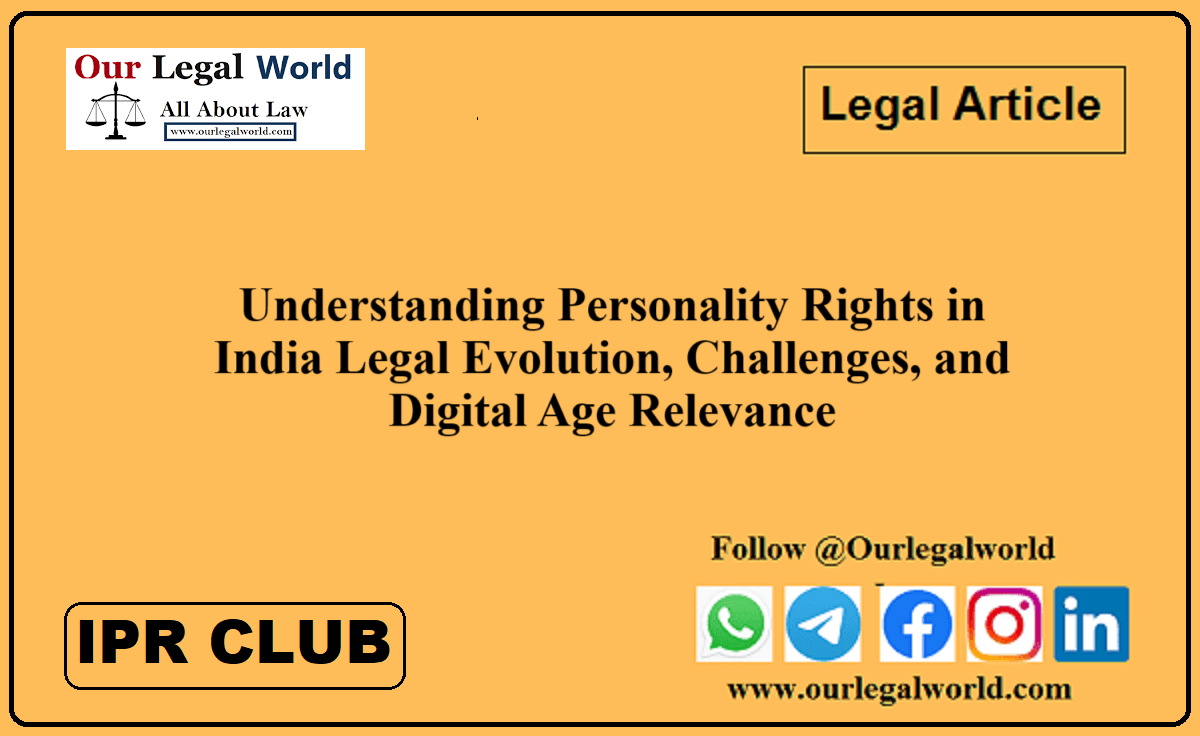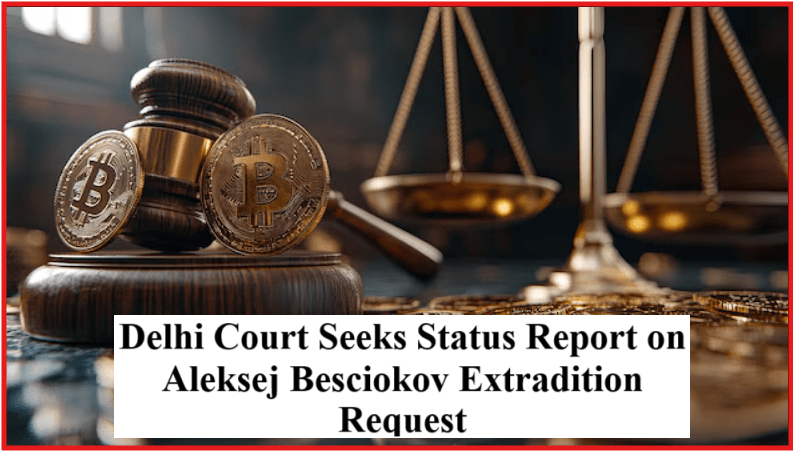Understanding Personality Rights in India: Legal Evolution, Challenges, and Digital Age Relevance
Written by Aravya Gupta, 1st Year, National law University, Delhi.
ABSTRACT
This article delves into explaining the term personality rights in detail along with exploring various elements associated with the term, its evolution in modern times and emphasizing on its growing importance. As the digital landscape grows, the need to protect an individual’s privacy and possession rights have assumed utmost importance paving way for active judicial intervention as well as expansion of existing legal policies. This article will aim to understand the meaning of personality rights through a legal lens, its shortcomings and its application in India.
INTRODUCTION
Personality rights refer to a collection of rights that an individual possesses that protect their name, image, likeness, and any other distinct aspect of theist identity from unauthorized commercial exploitation. This right encompasses various domains within it which can be categorized as commercial and noncommercial aspects. It gives the individual the freedom to ensure that their persona is used in the way the individual wants. Moreover, it also ensures that the individual is protected against defamation at all times. The rise of celebrity/ influencer culture during and post the pandemic has led to an unprecedented increase in the usage of personality rights by celebrities including high profile celebrities such as Jackie Shroff, Amitabh Bacchan and Anil Kapoor. Additionally personality rights are also interrelated to privacy rights which protect unauthorized intrusion into an individual’s life. In the digital landscape achieving a balance between freedom of expression and protection of personality is a tough task.. Such a rapid evolution of technology is highlighting the existing gaps in the policy framework as some countries have the policies to address such issues while other countries such as India are lagging behind. Through this article we will explore the different legal dimensions associated with personality rights within the Indian context, their shortcomings and the way forward.
Also Read: Novozymes vs Assistant Controller of Patents
ELEMENTS OF PERSONALITY RIGHTS
The various domains of personality rights can be broken down into various categories for a comprehensive understanding of its key elements. Apart from the possession and privacy rights there are numerous other rights that exist such as moral rights which ensures that the individual is treated with integrity and their work is neither mutilated nor distorted. Another essential right ensured is the right to control their image in the digital domain, as the rise of social media is inevitable the individual possesses the right to safeguard their online image. This is done mostly to protect the individual from social media misuse.
Another important domain is the cultural aspect of personality rights, this refers to the background heritage and the cultural identity a person represents when in the public domain. This can be better understood through an example from bollywood as actor Sanjay Dutt took legal action against unauthorized use of his image which led to intertwining of his current work with his image and misrepresentation of his family legacy and his culture. Such increasing insensitivity further complicates the problems associated with personality rights. Another dimension is the right to object to harmful usage, meaning that the individual has a right to legally take action if their image created is harmful to their mental health. A good example for this right is how teenage actors are often treated and their negative image leads to irreparable damages such as actor Britney Spears faced an extremely negative image created of her by the paparazzi merely for their commercial benefit without any regard for her mental or physical well being.
Since the 2010s, there has been a shift of focus and this right is being more recognised. Additionally the individual also retains the right to privacy in personal spaces which is often violated by the masses due to their over excitement or sometimes for their selfish gains. To protect themselves from such exploitation, they retain the legal right to take action against such people if they are caught stalking, surveilling or simply intruding the individuals private space. Lastly they also enjoy the right to prevent from misappropriation, essentially meaning that they can sue a brand if they use their image to sell their products like we see in the case of actor Amitabh Bachchan who sued a tobacco company for using his image and voice to sell their product without his consent which not only degraded his public image but also caused him commercial harm. These elements of personality rights highlight their thorough examination from a legal lens.
LEGAL ANALYSIS
Personality rights in India are a result of complex interplay of different legal forces to protect the individual’s name, likeness, image and most recently their privacy. Although there is a vacuum in terms of a comprehensive legal framework yet there are various statutory frameworks that can help fill this void. Like, the Indian Copyright Act, 1957 provides morality rights to each individual which safeguards them from other creators claiming ownership as well as preventing mutilation of their creations. Notably, this act was used by singer Pritam Singh where in his music was used by a film without his permission following which he filed a suit under the copyrights act more specifically the moral rights under it for unauthorized use of his works which led to damage of his image along with the monetary losses suffered. The court eventually ruled in his favor highlighting the importance of morality rights and showcasing how present legal frameworks can be used to safeguard the rights of the creator.
The Trade Marks Act, 1999 is an act under which the individual can register his personality or certain attributes of his personality, protecting it from unwanted usage. In the case of Satyajit Ray, some people trying to make a profit after the actor’s death sold merchandise using his name even though the filmmaker was in no way associated with them nor did he endorse them. Following this the estate of the filmmaker filed a suit against them. The court ruled in the favor of Ray protecting the individuals identity along with their rights or their posthumous rights. Apart from these, personality rights directly stem from article 19 and 21 of the Indian constitution aimed at protecting an individual’s freedom of speech and right to life. In the case of R.Rajagopal v. State of Tamil Nadu where in rajagopal aimed at publishing an autobiography of auto shankar a convicted criminal was stopped by the government. Following which he filed a suit under article 19 and 21 of the constitution, the court ruled in his favor and highlighted that fundamental rights are not absolute and need to be balanced in each case. Further, allowing such publications would strengthen personality rights allowing each individual to control how their narrative is portrayed. Finally the court also said that the right to privacy of the individual needs to be balanced against the public interest. Thus, even though no particular framework exists in India yet, the expansion of existing frameworks via active judicial involvement has allowed the individual’s personality rights to be protected. This will be further explored through a legal analysis of the same.
CRITICAL LEGAL CHALLENGES
One of the foremost challenges posed to personality rights’ protection is by the rise of new-age communication methods of memes and deepfakes as they misrepresent the individual’s character for their own commercial gain infringing on the individual’s rights. Notably in 2020 actor Kartik Aaryan faced exemplary public backlash as a meme went viral which portrayed him in negative limelight during the pandemic weakening his public image. Such new challenges highlight the gaps in existing frameworks and a need to continuously evolve with the times. Stringent regulations need to be formulated to put an end to unwanted digital exploitation. Another threat posed by deepfakes is that as the AI technology is rising along with rise in digital footprints of the actors/influencers, this can distort or create new images/videos that can have damaging effects and spread contrary messages. As we see in the case of singer Taylor Swift whose political views were misrepresented by such deepfake videos that she eventually had to come out and endorse her political candidates to put an end to such speculations. This highlights the global policy gap in solving these legal challenges. Moreover, this also indicates the lack of privacy rights and how manipulative maneuvers force the individual to publicly share private information. As the awareness and judicial intervention have increased substantially over the past few decades yet the lack of policy, evolving technologies and slow government responses have fueled the existing legal challenges.
CONCLUSION
Personality rights in India represent a critical juncture of balancing privacy and public rights. To effectively address the needs of all stakeholders, a comprehensive legislative policy is the way forward. Moreover, active engagement with large technology and data companies can help in understanding the pressing technological challenges. Lastly, raising awareness about the rights of an individual can help in fostering a more ethical and respectful society where each individual’s image is controlled by them only.
BIBLIOGRAPHY
- Mitigating Deepfake Threats: How Existing Laws Can Tackle Misuse https://www.livelaw.in/mitigating-deepfake-threats-how-existing-laws-can-tackle-misuse
- Anil Kapoor case- https://www.livelaw.in/top-stories/delhi-high-court-anil-kapoor-voice-image-misuse-personality-rights-238217
- PROTECTION OF PERSONALITY RIGHTS IN INDIA: ISSUES AND CHALLENGES- Protection of Personality Rights in India: Issues and Challenges
- https://lawresearchguides.cwru.edu/IP/personality-rights
- Understanding Indian Laws Protecting Personality Rights- https://bwlegalworld.com/article/understanding-indian-laws-protecting-personality-rights-522552
- Jackie Shroff- https://www.livelaw.in/high-court/delhi-high-court/delhi-high-court-jackie-shroff-personality-publicity-rights-257842








